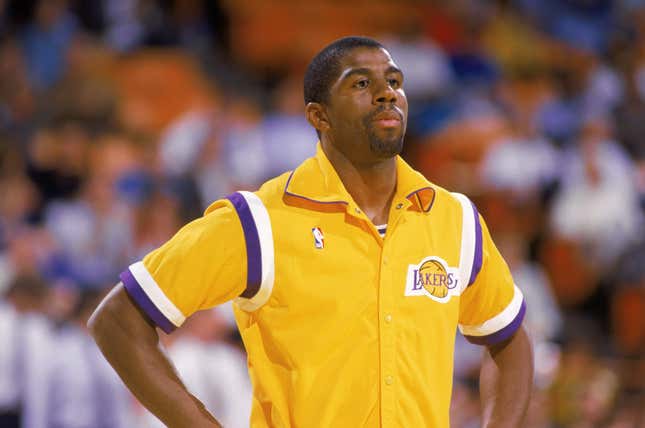
What’s in a name?
While we can all relate to juggling various personalities—I’m pretty sure the same person drowning in poor decisions and Hennessy on Saturday night is nowhere to be found in your staff meeting on Monday morning—They Call Me Magic explores the two distinct personas of one of the greatest athletes in the history of professional sports.
Magic Johnson is, of course, the Los Angeles Lakers’ revered five-time NBA champion, whose $600 million smile and undeniable charm continue to dazzle and captivate audiences to this very day—much like he did on the court once upon a baby skyhook. He’s also the same guy whose exhilarating style of play (and fabled rivalry with Larry Bird) resuscitated the league and helped save it from the brink of financial ruin upon his arrival as the No. 1 overall pick in the 1979 NBA Draft.
Earvin Johnson, however, is the youngest of six siblings, whose formative years in blue-collar Lansing, Mich., took an unexpected turn when, instead of becoming the latest recruit for basketball juggernaut Sexton High School, he was bused to the painfully white Everett High School—where he was greeted by sticks, rocks, and racial epithets being hurled by his prejudiced classmates. And while the name of this series hints at the existence of these two polar opposite personalities, the series itself demonstrates Johnson’s struggle to reconcile between the two.
“He’s Earvin,” ESPN’s Michael Wilbon declares. “I don’t call him Magic, because Magic is a character that played basketball. He’s like a superhero.”
If you let his friends and family tell it—Johnson’s inner circle looks drastically different than the rest of ours, as They Call Me Magic has no shortage of familiar faces like Barack Obama, Samuel L. Jackson, or Snoop Dogg offering their two cents—Magic is the gregarious one who “loves the crowd and attention,” while Earvin is described as “quite impatient” and “very controlling” by his son, EJ. These traits are further illuminated when EJ, who has since gone on to become a popular fashion commentator and socialite, details how horribly wrong things went when he revealed his sexuality to his parents.
“I always gravitated for things that are more feminine and stuff like that. And he, you know, that was not allowed,” he explains in the fourth episode. “He said, ‘You need to be masculine, you need to be this way, this isn’t the life I wanted for you.’ And I was just sitting there, which was like, well, this is very hard to hear.”
While it doesn’t excuse the insensitivity of Johnson’s initial reaction—their relationship has since been repaired and, by all accounts, is now better than ever—within the context of this series, it’s important to note that the Hall of Fame point guard’s relationship with the media underwent a seismic shift after it leaked his HIV diagnosis in 1991. Going from a media darling to a pariah literally overnight had to be traumatizing, and this revelation not only brought his NBA career to a halt but threw his personal life into peril. As such, he became far more protective of both his privacy and how he and his family were portrayed to the public.
To that end, Johnson’s HIV diagnosis also put his marriage under the microscope, forcing him to publicly admit that Magic’s womanizing ways—and constant infidelities—brought chaos and confusion to Earvin’s relationship with his wife, Cookie. Since its impetus at Michigan State University, their on-again, off-again union had been tested by Magic’s inability to resist outside temptations. And as They Call Me Magic chronicles in great detail, this lead to Earvin pulling the plug on their engagement not once, not twice, but on three separate occasions.
Bruh.
As a result, he wasn’t exactly the most popular person in the Kelly household—shout out to her parents, Cora and Earl Kelly, for not putting money on his head—especially after Johnson introduced Cookie to Andre, the first-born son she didn’t know that the love of her life even had.
For hoop heads, this docuseries provides plenty of basketball lore to pillage through: the infamous coin flip that gifted the Lakers their future three-time Finals MVP, how the Lakers’ bombastic owner Jerry Buss revolutionized the league by combining sports and entertainment, the dissolution of his bromance with fellow NBA great Isiah Thomas, his legendary rivalry with Larry Bird, and much more. However, all the hoop stuff—while painstakingly researched and executed—was already a mere Google search away. It’s the intimate glimpse into Johnson’s personal life that’s far more riveting, as the duplicitous lives of Magic and Earvin intersect in both triumph and disaster.
To be clear, They Call Me Magic isn’t ESPN’s instant classic The Last Dance—and that’s a good thing. While the latter has been accused of being self-congratulatory, the argument can be made that through its prism of remorse and brutal honesty—something sorely lacking in Michael Jordan’s own immensely popular miniseries—the former is actually self-deprecating.
It deploys a unique approach to exploring the duality of balancing international celebrity with being a flawed father and husband. And whether you know him as Magic; Earvin; his disc jockey persona, EJ the DJ; the “coach killer,” Tragic Magic; or his childhood nickname, Junebug; this is a brilliant miniseries that will not only teach you about one of the most beloved figures in the history of professional sports, but might even teach you a little about yourself.
Because after all, what’s in a name?
They Call Me Magic is available on Apple TV+.

